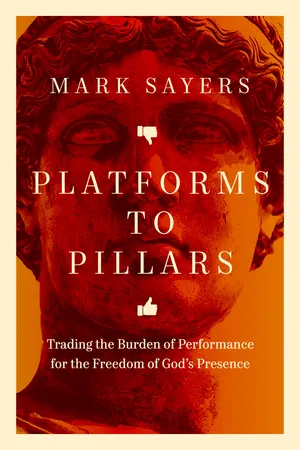
Platforms to Pillars
Trading the Burden of Performance for the Freedom of God's Presence
- 192 pages
- English
- ePUB (mobile friendly)
- Available on iOS & Android
About this book
A biblical response to living in a platform society.
Platform: A mentality, a way of approaching life, which promises to reinforce our uniqueness, deliver on our desires, and offer validation and visibility.
A platform society emphasizes individualism and performance. It’s rooted in the belief that self and personal desires are preeminent. In Platforms to Pillars, cultural expert Mark Sayers explores how platform mentality is misshaping our contemporary world and contrasts this to the biblical call of Christians to live as pillars.
By looking at the ancient world—a world remarkably similar to our own—Sayers explores the flaws of a platform society. Sayers takes a deep dive into the influence and allure of digital platforms on individuals and society, and he invites readers to envision a legacy that lives beyond themselves. Like columns in buildings, human pillars provide support and strength. They work together to create space for others, partnering with God as He advances His kingdom in the world. Human pillars fortify and protect community through virtue and character and pass these values to others.
Sayers shows us how to delight in God’s presence, enjoying the freedom that flows from belonging to Him. A much-needed corrective, Platforms to Pillars models a biblical and better way for Christians to live.
Frequently asked questions
- Essential is ideal for learners and professionals who enjoy exploring a wide range of subjects. Access the Essential Library with 800,000+ trusted titles and best-sellers across business, personal growth, and the humanities. Includes unlimited reading time and Standard Read Aloud voice.
- Complete: Perfect for advanced learners and researchers needing full, unrestricted access. Unlock 1.4M+ books across hundreds of subjects, including academic and specialized titles. The Complete Plan also includes advanced features like Premium Read Aloud and Research Assistant.
Please note we cannot support devices running on iOS 13 and Android 7 or earlier. Learn more about using the app.
Information
Table of contents
- Cover
- Title Page
- Copyright
- Contents
- Introduction
- Part One: Platforms vs. Pillars
- Part Two: Platforms
- Part Three: The Platform Society
- Part Four: Deliverance
- Part Five: Pillars
- Conclusion
- Acknowledgments
- Notes